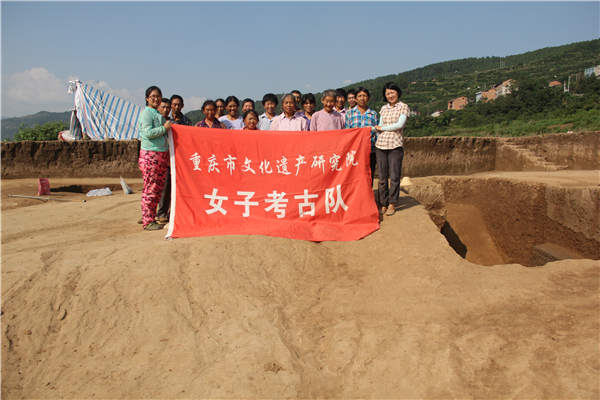

Li Dadi, the director of the archaeology department at Chongqing Cultural Heritage Research Institute, accompanied Ma Xiaojiao, a member of the women's archaeological team, in summer last year.
Ma was on an excavation in Chongqing's Liangping district, which is her hometown. However, for months she was unable to find time to visit her family due to the tight schedule of the dig. A brief opportunity arose when there was a meeting in the downtown area of the district.
"I thought she deserved an opportunity to see her child and I asked her to go back," Li says. "When she was leaving to return to the site, the child wouldn't let her go, holding her legs and crying: 'Mum, will you come back?'
"I was barely able to hold back my own tears, too," Li says, his voice cracking with emotion.
"Women are given many roles-we're expected to be good daughters, wives and mothers," says Yan, the mother of a 6-year-old boy. "But we can also be equally excellent archaeologists like men, which is sometimes ignored in our society-like women in the construction industry or geological exploration. We have every reason to spare no effort to ensure the projects are a success."
In August, when Zhong Fangrong, the girl with the fourth highest national college entrance examination score in Hunan province, chose archaeology at Peking University as her major, it became a hot topic online as some people doubted her choice.
However, something that the public probably does not realize is that many of China's biggest archaeological discoveries are credited to females. The tomb of Fuhao, for instance, of a queen and wartime heroine from the Shang Dynasty (c.16th-11th century BC), was found by Zheng Zhenxiang, veteran Chinese archaeologist, in 1976.
And, six among 16 of Yan's college classmates are also women, and all of them still hold positions in archaeological studies.
"When it comes to archaeology, the general public tends to focus on the unearthing of brilliant cultural relics, and often neglect the unsung, behind-the-scenes heroes who have been stationed in the wild for years and sacrificed a lot," Bai says. "The all-female team is their outstanding representative. We need to salute to them."
Every night away from home, Yan still finds some time to video chat with her husband through WeChat.
"Thanks to easy communication now, I can still follow and guide my son's growth, like helping with his homework," she says. "It's a big task, which needs me and my husband to work together."